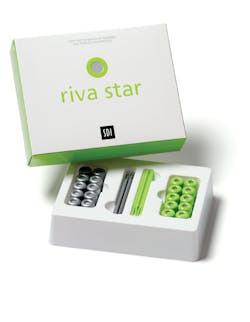Products for coping with pandemic-related challenges: Riva Star
Editor's note: In an effort to keep you informed of products that can help dental practices during the COVID-19 pandemic, Dental Economics columnist Howard Glazer, DDS, FAGD, has authored a special multipart series. In each installment, he reviews a product that can assist you during this challenging time.
Riva Star
Treating a carious dental emergency can often be tricky when trying to avoid the use of a handpiece and aerosolization in the office. Enter Riva Star Tooth Desensitizing Agent and Cavity Cleanser from SDI, Inc.It has long been established that the combination of silver, iodide, and fluoride have an almost immediate and long-lasting effect on dentinal hypersensitivity. Typically, silver diamine fluoride products provide relief but result in negative black discoloration. Riva Star is an antimicrobial biofilm inhibitor that affords us the opportunity to provide a non-invasive or minimally invasive way to treat decayed dentin. Riva Star also allows us to treat decay at its earliest stages while desensitizing the tooth and cleansing the cavity prep, all without the black stain.
The product comes in silver and green color-coded capsules: silver containing silver diamine fluoride and green the potassium iodide. Each capsule combination can sufficiently treat five teeth. Instructions clearly indicate how this two-step procedure minimizes staining; by applying the potassium iodide over the silver diamine fluoride a precipitate is formed, which does not stain the tooth. You can then restore over this combination with a glass ionomer (Riva SC GI), then a bonding agent (Riva Bond LC) and a composite resin such as aura eASY. This so-called SMART Care technique is designed to treat and reduce pulpal inflammatory response and facilitate the remineralization of carious dentin, thereby arresting decay and protecting from future bacterial invasion, all while preserving tooth aesthetics. Be aware though, this treatment is not indicated for symptomatic teeth. Make sure to keep thorough notes and let the patient know—either verbally or in writing—that this treatment may show decay under the restoration.
About the Author

Howard S. Glazer, DDS, FAGD
Howard Glazer, DDS, FAGD, is a columnist for Dental Economics. He is a key opinion leader in dental products and maintains a general practice in Fort Lee, New Jersey. Dr. Glazer is a fellow and past president of the Academy of General Dentistry. He lectures frequently on the subjects of dental materials, cosmetic dentistry, forensic dentistry, and patient management.
Updated May 19, 2020


